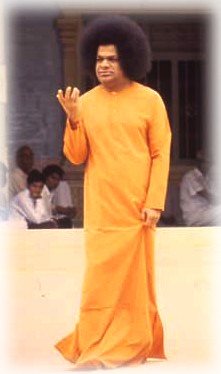|
To: |
 |
To: |
![]()
![]()
![]()

As learnt at
the Lotus Feet of Bhagavan
by
N. Kasturi (1897-1987)
![]()
![]()
![]()
![]()
![]()
![]()
PART-III
PART-III And the
third path that leads to Prasanthi
is, as the Gîtâ
too lays down, seva. Seva means 'dedicated
activity', 'selfless karma'. Karma (work)
is volitional, different from involuntary, instinctive,
automatic responses and reactions. Karma is
prompted by desire and planned by the mind. It ranges
from the casual to the calculated, from the trivial to
the tremendous. Whatever the nature or purpose, each act
has a consequence, patent or latent. It builds one's
habits and character, opinion and attitude, fervour and
faith. The sower must reap the harvest. It is his right
and it is his responsibility too. He cannot disown these,
even when he casts off this body, for the body is not he;
it was his, that is all. Another vehicle has to be
boarded by him when this one is discarded, a vehicle he
himself has wrought by his karma. The
Moghul Emperors built magnificent tombs for themselves
while alive - so do all men build, brick by brick, the
palaces or prisons which they will inhabit during their
future lives on earth. No man can now escape the crown or
the cross he fashioned for himself with his karma,
during previous lives. Therefore we are exhorted by Swami
to pay reverential homage to our karma, whatever
it be and wherever it is performed, since it alone has
shaped the present and is now moulding the
future. Swami
has described the chain of causation thus: Janma
(our birth) is caused by karma (the quality and
quantity of the activities, physical, mental and
spiritual, while here on previous occasions).
Karma is caused by kâma (desire,
lust, the sense of want). Kâma is the result
of mâyâ (the fascination for the
false). And mâyâ is the creation of
ajñâna (the ignorance of one's
reality). The knowledge of one's reality can be gained
slowly by those who are action-oriented
(karma-prone individuals) but, the investigatory
process (the path of jñâna) can often reveal
it in a flash. But the negating technique of
neti,
neti
(not this, not this) is faced with its presence in love,
power and wisdom everywhere: the action-intensive person
has to be led along several levels of activity
(sâdhana) to achieve the cleansing of the
mirror of consciousness in order that the truth may be
reflected therein. The
second is that of Upâsana, worship, when man
having realised in the course of his activity that he,
and in fact all things, live and move, not at their will
but at the subtle command of some supreme controlling
hand, bows before this power in reverence and homage.
The
third and last section is Jñâna,
inquiry ending in knowledge, when man, having recognised
this mystery, seeks to examine, understand and finally,
draw near its solution. Scholars
and commentators on the Veda generally believe
that the first two sections help to purify the mind and
clarify the intellect but cannot do more. They can only
lead to the culminating stage of
jñâna by which realisation is
attained. Swami however posits that all modes of
sâdhana (karma, upâsana or
jñâna) are equally valid paths to the
truth, provided they are taken up by men who are straight
and clean [see also Yoga,
meaning and types]. The
Bhagavad
Gîtâ is
divided in 3 sections: As is
described in the scriptures, the vedic sacrificial
yajñâ originated from the belief that
the Supreme Being had sacrificed Itself in creating the
universe. The ancient vedic rishis looked upon the entire
cosmic process as the unfolding of a great Sacrifice and
believed that man's spiritual nature can best be
quickened if he tries to mould himself in consonance with
that cosmic order. So, when actions concerned with the
ritual of yajñâ are performed, they
are understood to symbolise the fact that all activities
in life must be performed as sacrifice to the divine. The
second is the Brahma
Yajña,
also called the Veda Yajña or Rishi
Yajña. It is our duty to adore the scriptures
that reveal Brahman, beginning with the
Veda which was discovered and communicated by the
rishis of yore. As long as he lives, a man must
realise that he has been given this body and this span of
years in order to make another bid for liberation, having
failed to gain freedom in previous births. Man has
therefore to sacrifice the temptation to fritter away his
allotted time and steadfastly equip himself for the task,
by the study (swadhyâya) of the means as
described by those who had achieved victory. He must
listen, assimilate what he has imbibed and then test its
validity on the touchstone of practice. Swami wants man
to welcome the wisdom of all ages and lands, for,
mountaineers climb routes of their choice only to greet
each other at the peak. The
third Yajña is the one that is done for
the good of society by the sacrifice of one's egoistic
impulses to promote social harmony, peace and justice. It
is called the Manushya
or Athithi
Yajña.
'Manushya' means 'man'; 'athithi' means
'guest', 'he who stays for a day'. It is significant that
in this context the alternative term for man is
athithi, guest. It is a reminder that every man is
but a guest on earth, entering at dawn and departing into
the darkness. He therefore owes all gratitude to the
human community that receives him as he arrives, helpless
and empty-handed, and gives him all that he calls his own
for that while - even his health, mental and physical,
his prejudices and preferences, his outlook and insight.
Man, as an individual, is essentially the product of the
society that has moulded and modelled him. He is given
this opportunity of life on earth as the limb of a
community, in order that he be exposed to various
pressures which act as alchemy to turn base metal into
gold. The
Yajña begins when he submits to these
pressures and acts for the good of all, abandoning his
own selfish purpose although he must be ever alert
against influences that could stunt him, or make him a
robot or drag him with its siren call into slime and
slush. "Man is born free but is everywhere in
chains," lamented a philosopher who must have
forgotten his own childhood for, as every schoolboy
knows, "Man is born dependent and bound, but is
everywhere striving to break the chains that bind
him". He is dependent on the society that sustains
him and yet binds him with its language, its customs and
controls. By sacrifice he wins his freedom, through
gaining clarity of intellect from the company of the good
and the godly. Swami says that each man is but a cell in
one integral whole, that is, the social organism; and the
many parts of this organism are constantly engaged in the
task of mutually aiding each other in order to achieve
the goal of salvation for all. "Sai has come in order
to unite all men into one family through the bond of
brotherhood," He revealed. When a
man grows deeply sensitive to his fellow-men, eagerly
partaking of their joys and their griefs as his own, then
he clearly experiences the unity of mankind. When he
longs to serve others and freely offers them his time,
skill and resources to alleviate their suffering, he
would at last have succeeded in achieving the immense
task of subduing his ego. It is only when this barrier
that separates him from other beings is pulled down can
he realise that, the barrier was erected by him
alone! This
attitude of service and sympathy when steadily followed
deepens and ripens with time into the sublime emotion of
selfless sacrifice which blossoms into the fourth
Yajña, Bhûtha
Yajña
(sacrifice to all beings). The oblations sanctified by
this sacrifice are love, compassion and understanding of
all living things that are liable to pain, suffering,
hunger and thirst. Manu, the ancient lawgiver
[the first earthly creature created from
Brahmâ], cautions against any indulgence
in contempt, harshness, indifference or insult - even a
trace of these would pollute the sacrifice and react on
the person who gives, he warns. An ancient scripture
named the Vâjasaneyi-(Yajur
Veda)-Samhitâ
has a section on S'iva wherein God is identified
with two hundred and fifty nine entities in the
cosmos. This shines forth as the most comprehensive
concept of God. The Bhûtha Yajña
directs man to treat all these and others beyond too with
love and understanding for all forms are His. Or rather,
God is all that is, in every cell or atom of everything
that exists - in worms, wasps and caterpillars, locusts
and bugs, birds, beasts and plants and the hills and
springs, the clouds that drift by, and the streaks of
lightning that flash and human beings of all ages,
creeds, status and temperaments; the child, the decrepit,
the blind, the lunatic and the criminal. Everyone of
these has to be revered as actors in the divine
drama. The
fifth (last) of the Yajñas and the
most indispensable of all is the
Deva
Yajña,
the offering of gratitude to God. Christopher
Smart,
an English poet, was kept in confinement for madness but
he had a vision of this knowledge and gratitude; he had
sensed the understanding whose radiance filled the
universe and whose flames swept through the skies. The
words that poured out of his entranced soul was the
Song to David: For,
"In the beginning, love arose; Love was the primary
germ-cell of the mind," says the Nasadiya hymn
of the Rig Veda. That love has ramified into the
innumerable nuances of emotion that we know - desire,
covetousness, craving, yearning, attachment, affection,
relishing, liking, pining and a hundred other forms of
fancy and fantasy. Nevertheless, S'rî
Krishna acknowledges as valid only the love which is
in conformity with dharma, right conduct that
upholds and safeguards society. Love is the first-born of
the absolute. It stimulated the inaugural activity, the
primal positive dynamism. Each being, however
infinitesmal or immense, is the expression of the
infinite and the eternal and for that very reason the
urge to love, to expand and include, to sacrifice and
gain, to lose and win, to share and fulfil, makes He and
We into One. "When
I love Myself, I love you. When you love yourselves, you
love Me. I am you and you are I," Swami once wrote to
the students of His College. The devotee of God is
blessed with unshakeable conviction of this truth as a
reward for his devotion. "The
eye with which I see God is the same eye with which God
sees me. My eye and God's eye is one eye, one sight, one
knowledge, one love", [Johannes]
Eckhart
[1260-1328], the mystic philosopher of medieval
times cries out in rapture. Since we are from God and for
God, we are restless until we rejoin Him; and He too is
watching us, to see whether we stray, whether we seek to
quaff poison to quench our thirst for Him, instead of
pure pellucid nectar. We have
indeed grown today into one single body nourished by
earth and sky, with limbs that dig the moon and dip into
the satellites of Saturn, with a nervous system that
responds to the remotest bleep and with a memory that
preserves the history of millions through millennia. But
mankind has also grown into a maniac intent on suicide,
or homicide! The beast is suffocating under the weight of
its pachydermic coat, its fangs, claws and horns. It is
fast sinking into its own accumulated filth. Swami has
arrived to rescue mankind from perdition. He was hailed
as Guru even as a toddler and who, at the mere age
of fourteen announced that He had come to countermand
extinction, to immobilise fratricidal fury, to cleanse
its memory and motive and to feed it and foster it on a
diet ot Divine Love. This
role of Savior was assumed by Swami, when he responded to
the anguish of helpless men caught in the inexorable
march of events towards destruction. Sai has not
the slightest trace of anger in His composition. His
hands hold only one weapon - the weapon of Love. He is
Love. He showers Love, He arouses Love, He affirms Love,
He accepts Love. "If you desire to know My Nature, let
Me tell you, I am Prema Swarupa," He says, "Love
with Form". Love
understands. Where there is understanding there is
sharing and caring. "Love is self-lessness; self is
lovelessness," Swami declares. Love involves
sacrifice; it sweetens the act of sacrifice. The very
first sacrifice was performed by God who sacrificed His
uniqueness and His freedom, when Maya induced the
desire in Him to appear as the Many. This primal desire
was the desire for love, the need to give love and get
love. Love is the law, the truth, the perennial pattern,
the Rta
[or spelled as Rita] of the universe, it
is that to which the universe clings; it is that which is
the purpose and end of everything in
existence. The
philosopher Pierre
Teilhard de Chardin
speaks of love, as the property of all organised matter.
"If
there was no internal propensity to unite, even at a
prodigiously rudimentary level - indeed, in the molecule
itself - it would be physically impossible for love to
appear higher up, with us, in the 'hominised' form ... .
Driven by the forces of love, the fragments of the world
seek each other so that the world may come to being. This
is no metaphor and it is much more than poetry... . Love,
in all its subtleties, is, nothing more and nothing less,
than the more or less direct trace marked on the heart of
the element by the psychic convergence of the universe
upon itself. Love alone is capable of uniting living
beings in such a way as to complete and fulfil them."
The
vision of Teilhard
de Chardin,
the mystic of modern times is much the same as that of
Meister
Eckhart
of many centuries ago. It is also the same in its essence
as the truths the Rishis of Vedic times
proclaimed. When godly men speak, their words may be many
but their understanding is indivisibly ONE. "Who
could have breathed or moved if the skies were not filled
with joy and love?" asks the Upanishad.
Indeed! For the need to give love and to receive it, is
the reason that caused Him to devise this exuberant
absurdity of mâyâ, of the 'multitudes'
that seek Him with the tribute of love, joy, the emotion
with which He plays at hide-and-seek with Himself. Love
is the source of Joy. To love is to be joyful. We long to
live because we love the world, in spite of all the
contradictions it presents to us or even on account of
them. Why? Because our varied moods of love and joy for
the million things of the world are faint echoes of God's
first desire, to give and receive love and confer
joy. It is
true that agony and agitation rather than love and joy
seem to be the keynote of existence in the world. But
that is because we have forgotten our truth and strayed
into frail falsehoods. If only we remembered that we are
inseparable parts of the Vastness, that is Eternal and
All-pervading, time and space would be as harmless to us
as the shadows that the sun casts. They leave us
unscarred. Since
God's game, mâyâ, fosters this
illusion of separation, we must strive and struggle to
realise ourselves as no other than the Supreme Self. The
first step in breaking through the belief in our separate
identity (ego) is to help another. The association that
service creates, brings an understanding of the problems
of the other. Understanding grows into sympathy and
sympathy inevitably flowers into love. Love wishes to
become one with the loved. Only in love can we realise
our one-ness with all, and from that stage realise that
there is one ONE, and so, recover peace and quiet at
last. This
stage of returning to the source of infinite love has
been called Brahma Vihara, the journey to God, by
the Buddha who insists that he who aspires to
reach this stage "shall deceive no one, entertain no
hatred for anybody and never wish to injure through
anger. He shall have measureless love for all creatures.
Above, below and all around him, he shall extend this
love." Where then, is the place for anger or hatred
for there really is no 'other' apart from ourselves? Such
passions only prolong the agony of dismemberment. Give
love a place in your heart, for when it is fostered
there, its warmth will expand the membranes of your
individuality until they fall apart and you are able to
rest on the sea of infinite love. "In
love, loss and gain are harmonised. In its balance sheet,
credit and debit accounts lie in the same column and
gifts are added to gains. In this wonderful festival of
creation, this great ceremony of the self-sacrifice of
God, the lover constantly gives himself - to gain
himself", writes Rabindranath
Tagore
in one of his essays. Since Creation dawned in a longing
for love, it is love alone that fills the world, whether
it is love thwarted that brings pain or love fulfilled
that gives joy. Love that is selfish is love that is
foolish, for then we are persisting in the belief that we
are distinct entities apart and against every other in
the world. But love that serves others is a ritual of
great power, for it repeats that First Divine Act when
the emotion of love surged in the Cosmic Being. And it is
ordained that we too must sacrifice, sacrifice our selves
to regain Him. This is
the path of Seva, Swami says, "The fulfilment
of man's life on earth consists in filling himself with
the love of God and channelising that love into acts of
service, service of all who are embodiments of God."
There is really no 'other', no 'neighbor'. Everyone is
oneself, for all belong to an indivisible Whole. Service
uplifts us, delights us, satiates our hunger, expands our
horizons. Service to man is worship of God, in the one
who gives and the one who gets, in the helper and the
helped. God has
endowed us with this marvellous body, this unique brain,
this soft supple tongue, this amazing mind, these hands
that can hold the tottering and heal the trembling. These
are not given to us in vain, to be neglected or to be
misused for hatred, envy, lust or pride. They have been
given in order that we constantly engage in a great
yajña, a sacrifice of recognising and
loving Him through all we do. Swami
teaches us that the yearning men have to serve others is
the echo of that primal desire for self-expression and
selfexpansion which caused the multitudes to arise; and
the longing to help and care and draw close to the other
is also the longing for unity that drives all beings,
when tired of multiplicity. In service therefore man
finds the best means of allowing his individuality to
flower, his personality to be fulfilled. To
highlight this principle of friendship, compassion, love
and seva, and through it, the lesson of the
underlying divine reality of all, has been the purpose of
sages since centuries. 'Sarvaani
bhoothaani Kalyaneem Vaacham' - 'Friendship with all ...
speaking with pleasing words to every living being, to my
own people, and to the foreigner'. this was the
Vedic prayer. Over and over they express this
wish: Friendship
(sneha) which draws people close is the fruit of
seva. A wiseacre once said, 'God gives us our
relatives but, thank God, we can choose our friends!'
Well, there lies the rub, for when we have the freedom to
choose, we have the freedom to choose wrongly and suffer.
But in friendship, which is no idle whim or fickle fancy
but is the richest essence wrung out of service and
sacrifice, there is no question of a wrong step. That
which is born from good can never grow bad or cause harm.
Sneha leads to love, and when love interpenetrates
hearts, they become one." But,
while this Passion of Christ is played out at the
human level, where even hatred unto death is received
with wideopen arms, at the higher philosophical level we
have this explanation, by Swami: "There are no foes,
for there are no others". The very first lesson in
seva that Swami gave the world lay in His choice
of Puttaparthi,
a historic relic of long lost glory, lying supine on the
banks of a lean, famished river (Citravathi)
and sunk deep in the midst of bleak hills, far away from
everywhere. It was a village in dire need and so it
deserved Him, on the basis of that credential alone, just
as the world rolling towards fire, fury and fratricide
needs Him today and therefore has Him. Love in
action! This is the seva that Swami is teaching us
by His example from His childhood days when He would seek
out the hungry and insist that His parents feed them and
clothe those whom He brought to their doorstep. He
protested when bullocks were yoked to heavily laden
carts. He warned the villagers against illiteracy and
gambling. He ridiculed their fascination for glamor and
glitter that impoverish the rural folk and their
indiscriminate adoption of urban fashions in dress and
demeanor. He filled the air with songs on the Names of
God and evoked such powerful divine vibrations that the
dreadful demon cholera was driven away from the villages
around. He taught the teachers at school that to spare
the rod was to save the child, for the rod can only feed
resentment and revenge. It can only toughen the skin and
harden the heart [see Sathyam
Sivam Sundaram].
At
school Swami helped His companions struggling with their
sums. When any of them had fever, His palm provided the
remedy. He restored stolen articles, discovering the
places where they were hidden by thievish boys and saved
them from further downfall, by timely advice. He revealed
the realm of the spirit to the elders of the village. He
instructed them in methods to tap the strength and
courage the Âtmâ was ready to confer
in profusion. When
the day came for breaking the bonds of family, kinsmen
and school, He announced the purpose of His Incarnation:
to elevate service to man as the surest and smoothest
route to God. "Do not worry", [see
here for the contents of the
letter]
He wrote with selfconfident assurance to His elder
brother (Seshamaraju) who was naturally agitated at what
he considered the increasing impudence of this young boy,
"I have an unfinished task before me. I have a mission
to fulfil." Swami declared that He has come to confer
Ananda on all men, to rescue every pilgrim who
strays from the straight path, to give every deprived
person what he lacks, to confer on all who adore Him both
peace and plenty, to encourage all to achieve serenity. (1)
We have to adhere to non-violence in thought, word and
deed; we must be cheerful so that we might spread cheer.
We should not carry into the company of men, faces
darkened - by gloom, unlit by smiles and bitter with envy
and spite. Soft and sweet speech alone is the worthwhile
sâdhana, says Swami. Even
time can weigh heavy, when it is not spent to spread joy
through light. Swami has declared that miracles
(chamathkara); induce transformation
(samskara) which manifests as paropakara
(service) which cleanses the mind so effectively that it
disappears. That even heralds the vision of the Supreme
(sakshathkara). In fact, each of us in entrusted
with this body-mind-intellect mansion of marvellous
mystery, so that we can march, steady and straight, along
the corridor of time, through the horizons of space, to
the Savior and the source. We are all cells in the body
of the One. How then can one cell be happy, when another
is hurt, when another is tortured or strangled or
silenced? The universe is a living system with a flow of
will that courses through it, much as blood through the
body or sap through the tree. Feed
the hungry, clothe the naked, befriend the lonely, nurse
the sick, lead the blind, lift the lame, guide the lost,
lend your tongue to the dumb, smoothen the wrinkles of
the old - these acts of service can draw the dew of
Divine Grace down on you. Let a hundred desolate faces
bloom when they imbibe the sunshine from your looks. The
recording Angel will, then, as Swami says, get your name
entered beside Abou ben Adam, as one whom God
loves. Many
may demur, arguing, "how does my neighbor deserve my
love?" Swami says, "the neighbor is given to you
as part of a plan which has given you to him as his
neighbor, so that you can love and serve each other and
expand your ego, until it is rendered too thin to be
felt. Judge him not, lest you be judged by him". "Do not
bargain, lest you lose the gain within reach."
Again,
let us try to identify this "thy neighbor." He is
'everybody', without doubt. The Vedas declare that
the globe is a 'family home' (vasudha eva
kutumbakam), a bird's nest (viswa needam). It
is a spaceship which is the cradle, the arena and the
grave of all the countless species of the living cells
arising, acting, activating and getting atrophied or
absorbed in the Divine. No line drawn on maps can exclude
anyone from our neighborhood. He may not pray to his God
the way you pray to yours but it is the same God that
responds to both. Swami says, "There is only one God
and He is omnipresent". So we cannot deny the love
due to the neighbor on the plea that he prays in a
language that our God does not know, or
appreciate. (4)
When the avatâr is intent on conferring
peace and plenty on all who adore Him, we mortals have to
grasp the significance of that vow of providence. Swami
says, "All Names are Mine. I reside in All
places." Therefore, those who adore Him belong to all
denominations, creed, and religions. Swami says,
"There are no atheists. No one should be labelled as
an atheist. For, though a person does not believe in God,
personal or impersonal, he cannot live without love,
which is God. His love may be directed to himself or
another, to a pet animal or profession, to riches or
renown. Or it may be directed to God or goodness, service
or sacrifice, virtue or values. No one can live long on
lies; he has to accept truth, at least the truth of his
existence and of his extinction." Therefore, the
message that we must translate into our daily life is:
Promote peace and plenty, as your share in the universal
adoration to God. (5)
Swami directs everyone to sanctify their emotions,
impulses and passions and equip themselves with total
devotion, bhakti. What exactly is bhakti?
Sage Vyâsa
defines it as joyful involvement in the worship of the
Lord. Sage Garga
(see S.B.
10:8)
identifies it with the longing to listen to the narration
of God's glories. Sage Sandilya
who has authored a classic text on bhakti says it
is unhindered ecstasy drawn from the thought of God.
Sankaracharya
explains that bhakti connotes the illumination
that results from the awareness of one's reality. Sage
Nârada,
the supreme example of devotion, tells us in his book on
bhakti, that it is the quality that induces us to
offer all our actions to God. Swami, however, identifies
bhakti with serenity, derived through the faith
that the just arid loving God gives us only boons -
whether we treat them as bouquets or blows. The bhakta
welcomes good and evil; he dare not even know them as
such. He sees, hears and feels only the grace of God. All
that happens to him or from him is either wages or bonus
from his Employer and Director. The more we adhere to
this serene disinterestedness, this unruffled equanimity,
the nearer we approach the ideal of servitude to
God. Swami
speaks of the mysterious but momentous kinship between
the eyes and the feet. When a thorn pricks the foot, the
eye weeps. It blames itself for causing the foot to
bleed. "I failed in my duty. I should have been more
vigilant and noticed the thorn lying in wait on the
track. The foot has no means to look ahead", it laments.
Swami advises us to assume the responsibility for guiding
and leading the defectives and delinquents, the wayward
and the vacillating, the myopic and the moron, for
service to them is service to God. Each of them is a
challenge, confronting us and insisting on response. How
can anyone sleep when men shriek for relief from torture
chambers? Or, feast, when children scramble for crumbs?
Or sing, when birds are caged? Or play, when lambs are
skinned alive? The Buddha announced that he would
not wish to be liberated until the last living being
attained release, for, he could not feel free when a
'brother' was in prison. Swami
opens our eyes to the stark truth. During a discourse, at
Bombay, he said, "When a policeman escorts a criminal,
you have to conclude that a criminal too is escorting a
policeman". Both are bound; neither is free. The one
is responsible for the other. Seva must result in
the victory of love over hate, of contentment over greed.
Then, the two can escape from bondage and peace will
reign. Seva
serves to promote the consciousness of unity which is
divinity itself. Suffering torments, despair disheartens
without distinction of creed or color. Gratitude for the
soothing balm, the healing touch, the warm handshake, the
pat on the back is given and received with equal joy in
all languages, by all people. Love for God is best
manifested as service to man, to every living being.
Swami
has laid down a curriculum for the training of those who
choose the sâdhana of seva. Besides
mastering the usual channels of service among civic and
rural communities, emphasis is laid on meditation
sessions, yoga lessons, choral chants and, what is, in a
sense, unique, the study of monistic and dualistic
systems of philosopy, which reveal facets of the reality
of God, nature and man. The
purified heart vibrates in consonance with every other
heart. When Emperor Dasaratha asked the assembly
of citizens, how is it that you wish to see my son,
Râma, installed as crown prince, while I
have been ruling the empire so justly?", their spokesman
recounted the sterling virtues of Râma.
Among them, he highlighted, "When men grieve, He greatly
grieves with them; in their hour of joy, He rejoices
greatly with them." [see RRV]
Man
has to worship God in the form of man. No other
form, not to speak of the formless, can enthuse him so
highly. God appears before man, in order to chisel and
chasten him, as Swami says, "In the role of a blind
beggar, an idiot, a leper, a criminal, an orphan, a
lunatic or as mad. You must peer behind the mask of
mâyâ, and revere the God, the
embodiment of love, wisdom and
power, through seva." The sages declare,
"We shall summarise the eighteen Purânas
(each one a heavy tome elaborating with examples the
Divine Attributes of God's multifarious manifestations)
in a single sentence: "Helping others is the best act,
while hurting them is the worst." The
Gîtâ has laid down seva as the
effectual means of attaining
Prasanthi,
Supreme
Peace,
sans desire, sans fear, sans I and sans he.

sevayâ:
...
by the rendering of service ... [B.G.
4:34].
![]()
![]()
![]()
![]()
![]()
![]()
![]()
![]()
![]()

- Citravathi, near
Puttaparthi
-

ch. 1 to 6: Karma Yoga, the yoga of perfect
action,
ch. 7 to 12: Bhakti Yoga, the yoga of devotion,
and
ch. 13 to 18: Jñâna Yoga, the yoga of
spiritual knowledge.
![]()
Aum Bhûr Bhuvah Swah Tat Savitur Varenyam
Bhargo Devasya Dhîmahi Dhiyo Yo Nah Prachodayat
meaning:
The original form of the body,
the lifeforce and the supreme abode;
that source of life most excellent,
that divine luster we meditate -
may this light illumine our intellect.
One
can also remember it as:
om,
earth, the ether, heaven,
that vitality we pray for,
the grace of God for everyone,
thinking pure in harmony
purovâca prajâpatih
anena prasavishyadhvam
esha vo 'stv ishtha-kâma-dhuk - [B.G.
3:10]
In the coming about in the beginning of the
generations, along with the sacrifices the Lord of
mankind [Brahmâ] said to this: 'Be more and
more prosperous; may this [sacrifice] bestow upon
you all that you desire'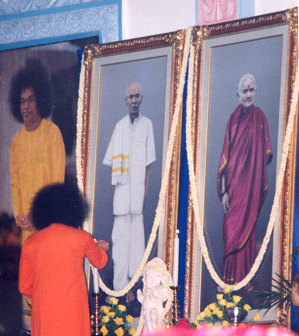 The
scriptures proclaim that each one of us has five
yajñas or sacrificial rites that must be observed
as long as life lasts. These lead man away from fear and
anxiety, restlessness and bondage to safety and serenity.
The Pitri
Yajña
is the first of these five, where a man's
earnings, comforts and joys must be sacrificed in order
to foster and please his parents. They are the dearest
embodiments of divinity within reach that we can serve
and satisfy. They have together endowed us with the
bodies wherein we are privileged to reside and witness
the resplendent unfolding of God's will. All acts
which express our gratitude to them are offerings at this
Yajña
The
scriptures proclaim that each one of us has five
yajñas or sacrificial rites that must be observed
as long as life lasts. These lead man away from fear and
anxiety, restlessness and bondage to safety and serenity.
The Pitri
Yajña
is the first of these five, where a man's
earnings, comforts and joys must be sacrificed in order
to foster and please his parents. They are the dearest
embodiments of divinity within reach that we can serve
and satisfy. They have together endowed us with the
bodies wherein we are privileged to reside and witness
the resplendent unfolding of God's will. All acts
which express our gratitude to them are offerings at this
Yajña
Of all things, the stupendous force
On which all strength depends,
From whose right arm, beneath whose eyes
All period, power and enterprise
Commences, reigns and ends.
The world, the clustering spheres He made,
The glorious light, the soothing shade,
Dale, champaign, grove and hill;
The multitudinous abyss
Where secrecy remains in bliss
And wisdom hides her skill." 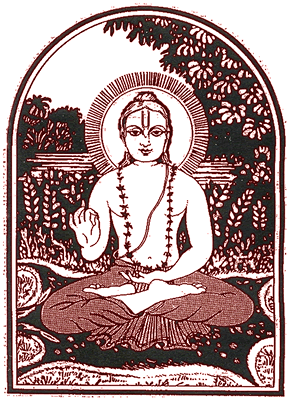 "Love
- that is to say, the affinity of being with being - is
not peculiar to man. It is a general property of all life
and as such, it embraces in its varieties and degrees,
all the forms successively adopted by organised matter.
In the mammals, so close to ourselves, it is easily
recognised in its different modalities, sexual passion,
parental instinct, social solidarity, etc. Further off,
that is to say, lower down in the tree of life, analogies
are more obscure until they become so faint as to be
imperceptible.
"Love
- that is to say, the affinity of being with being - is
not peculiar to man. It is a general property of all life
and as such, it embraces in its varieties and degrees,
all the forms successively adopted by organised matter.
In the mammals, so close to ourselves, it is easily
recognised in its different modalities, sexual passion,
parental instinct, social solidarity, etc. Further off,
that is to say, lower down in the tree of life, analogies
are more obscure until they become so faint as to be
imperceptible.![]()
![]() "Dasavathara
Danava
Samhara"
"Dasavathara
Danava
Samhara" ![]()
text
bhajan
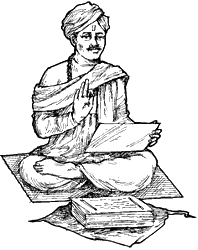 Swami
says that seva, considering the served as God, is
the highest spiritual sâdhana, yielding
fruit much quicker and more abundantly than the
sâdhana of japa (mantra-meditation) and
dhyâna (meditation); for, it enables us to
constantly practise in daily life that understanding,
which comes only at the culmination of many years of
spiritual struggle, that vision of God in the ant, which
Thyagaraja
saw, that vision of the divine in the donkey, as
Ekanath
saw.
Swami
says that seva, considering the served as God, is
the highest spiritual sâdhana, yielding
fruit much quicker and more abundantly than the
sâdhana of japa (mantra-meditation) and
dhyâna (meditation); for, it enables us to
constantly practise in daily life that understanding,
which comes only at the culmination of many years of
spiritual struggle, that vision of God in the ant, which
Thyagaraja
saw, that vision of the divine in the donkey, as
Ekanath
saw. 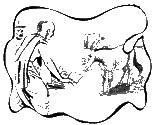 Swami
tells this story. Once Ekanath, the great mystic
poet was carrying a pot of water from the sacred
Ganga, as it emerged from the Himalayas to
Rameshwaram, at the southernmost point of India. He had
made a vow to walk the distance of fifteen hundred miles
and bathe the S'iva linga at this sacred
spot, on the confluence of three seas. The long
pilgrimage was almost ended, he was nearing the shrine,
when his eyes fell on a donkey writhing in agony as it
lay dying of thirst. Ekanath ran up to it and
poured the holy water, without hesitation, into that
gasping parched mouth. The animal's eyes gleamed with
gratitude as it looked up at its savior but his
companions were struck dumb with shock at this unorthodox
breach of the vow, after so long a journey, when it was
almost on the edge of fulfilment. Ekanath however
exclaimed in great joy, "The purpose is realised!
S'iva asked and received. S'iva came and accepted."
Swami
tells this story. Once Ekanath, the great mystic
poet was carrying a pot of water from the sacred
Ganga, as it emerged from the Himalayas to
Rameshwaram, at the southernmost point of India. He had
made a vow to walk the distance of fifteen hundred miles
and bathe the S'iva linga at this sacred
spot, on the confluence of three seas. The long
pilgrimage was almost ended, he was nearing the shrine,
when his eyes fell on a donkey writhing in agony as it
lay dying of thirst. Ekanath ran up to it and
poured the holy water, without hesitation, into that
gasping parched mouth. The animal's eyes gleamed with
gratitude as it looked up at its savior but his
companions were struck dumb with shock at this unorthodox
breach of the vow, after so long a journey, when it was
almost on the edge of fulfilment. Ekanath however
exclaimed in great joy, "The purpose is realised!
S'iva asked and received. S'iva came and accepted."
'Sarva deva namaskaaram, Keshavam prathi gacchathi' -
'Incense offered to any god, anywhere, reaches the one
God, Keshava'.
And then, He framed another pivotal axiom on the same
lines:
'Sarva jiva thiraskaaram, Keshavam prathi gacchathi' -
'Injury inflicted on any living thing anywhere reaches
the one God, Keshava'.
There is no jîva apart from Deva.
Each jîva is a cell in the Divine Body. It
is He who is the recipient of seva offered to
anyone; and it is He who is the real target which is hurt
when anyone is injured, defamed, belittled or neglected.
Swami asks us therefore to desist from disservice, if we
are not able to be of service. That restraint itself He
considers laudable!
May I look on all beings with the eye of a friend,
May we look on one another with the eye of a friend,
May there be understanding and concord,
With our people and with foreign people
May we unite in our minds, unite in our purposes,
And not fight against the divine spirit within us".
 Seva
to the best of our ability to everyone in need - this
should be our guiding star, for, need is indeed the call
to which the Savior responds. "When you call on me, I
come" says Swami, "or rather, when I do come, it
must be in response to your call though you may not even
be aware of having called. If you need me, you deserve
me." Let this criterion of God be ours too when we
offer that help to others, for, "This is my
commandment: love one another as I have loved you. There
is no greater love than this, that a man should lay down
his life for his friends," said Jesus. But, take
note, he died for the evil-doers and the wicked too;
"Father forgive them for they know not what they
do". To these men of God, there are no foes who stand
apart from those whom they call their friends. They offer
their service and love to all who need them. Theirs is a
friendship that cannot be defined in human
vocabulary.
Seva
to the best of our ability to everyone in need - this
should be our guiding star, for, need is indeed the call
to which the Savior responds. "When you call on me, I
come" says Swami, "or rather, when I do come, it
must be in response to your call though you may not even
be aware of having called. If you need me, you deserve
me." Let this criterion of God be ours too when we
offer that help to others, for, "This is my
commandment: love one another as I have loved you. There
is no greater love than this, that a man should lay down
his life for his friends," said Jesus. But, take
note, he died for the evil-doers and the wicked too;
"Father forgive them for they know not what they
do". To these men of God, there are no foes who stand
apart from those whom they call their friends. They offer
their service and love to all who need them. Theirs is a
friendship that cannot be defined in human
vocabulary.
(2)
No sensitive individual can stand by with folded arms,
when a companion loses control of himself and rushes
headlong towards a crash. It is our duty to help. Swami
wants us to be equipped not only with medical materials
for 'first aid', but even more essential 'first aid" kits
of wound bandages and balms of sympathy, courage,
consolation and counsel. "When God has incarnated as
man in order to rescue, reform and rehabilitate man, why
do you hesitate and refrain?" asks Swami.
(3)
When He is seen filling empty hands with boons and making
barren hearts bloom, we must yield gladly to the urge
which prods us to imitate Him. Let us discover what
others lack. Food? Freedom? Fun? Sight? Insight? Silence?
Let us assess our own resources. When we are reluctant to
share the riches we hoard and the skills we parade, we
are holders of stolen property in the eyes of God. How
can we uplift ourselves, when we are unwilling to
jettison the junk we hold so dear?
